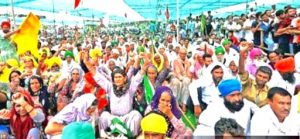
BENGALURU (India), September 12—Many garment workers have gathered in an area that was once frequented by a small tea-shop owner. He used to sell hot tea to hundreds of garment workers before they started their early morning shift. The shop owner is gone because most workers have no job. As much as 50% of garment workers are without employment. Most of them are gone as well.
These workers have come to the meeting because several members of the International Communist Workers’ Party (ICWP) have been going to the neighborhood. They are talking about communist revolution. Many workers are reading Red Flag. We are also massively distributing a short version of Mobilize the Masses for Communism.
What has attracted a larger number of workers is the recent news of the farmers’ struggle in North India. We see videos of thousands of farmers, farmworkers, students confronting heavily armed police. Many of our ICWP comrades are participating in these agitations.
An ICWP comrade opened the meeting. She said that everyday millions of people are losing jobs, food and petrol prices are rising, many workers are forced to go back to the villages with no jobs.
We in ICWP must take the initiative to mobilize the masses to destroy the capitalist system.
We must lead the masses to show that capitalism has no future. Only communism can create a society without the bosses, money, or banks.
Several workers were eager to talk now. Anu said impatiently, “I agree that we don’t need banks and money lenders. They rob us every day. But how can we live without money?”
Ranjana agreed with her and said, “Every month I struggle to have money. We are struggling because people like us don’t have enough money.” By now more and more workers had joined the conversation, and they were puzzled by a society without money.
Nisha has been working in a garment factory for over ten years. She joined ICWP last year. She said, “In my workshop, we women make very little money even after twenty years. Then we have supervisors who make lots of money after six months. Many of them are men.” This opened a discussion about why women workers generally earn low wages, while they have to work at home and take care of the children.
“Women workers are low paid. But they are also sexually abused in the workplace as well as in the streets. They are fearful of retribution. The situation is worse for Dalit and Muslim workers. And it gets unbearable if they are from Bangladesh,” said a worker who came to our meeting for the first time.
Now the ICWP comrade suggested that gender, race, religion, immigration status divide the working class because bosses make super-profits from these wage differences. Workers have to exchange their money for things they need to survive. If we don’t have enough money, we cannot buy necessities, no matter how much we need them. Many workers are desperate, and they borrow from banks or loan sharks. That grinds them to extreme poverty.
On the other hand, capitalists either borrow money or use the money from our own wages to modernize factories, transport, supply chain. This results in fewer jobs and increased production. But now the cost of making a new garment is lower, which means they have to produce a lot more to survive and stay afloat. They have to compete endlessly against other capitalists.
Marx described this phenomenon: “Capital is dead labor, which, vampire-like, lives only by sucking living labor, and lives the more, the more labor it sucks.” The retooling, modernizing factories with a machine is dead labor.
For our class enemy, money is a way to make more money. This is the only way they can survive. Money for them is a social relationship of exploitation. During this competition, those capitalists who cannot make more money, cease to exist, causing mass unemployment. Those who make more money, continue to exploit workers by mass production and reduced workers, resulting in layoffs.
Workers must go to the root of this contradiction: workers must seize the means of production and end the rule of class exploitation. Only the working class can resolve this conflict that puts the international working class in a direct confrontation with the bosses.
We had an absorbing exchange of ideas about money. We welcome all to contribute to this discussion. More people want to come to our next meeting. We all took extra copies of Red Flag. The struggle continues.


